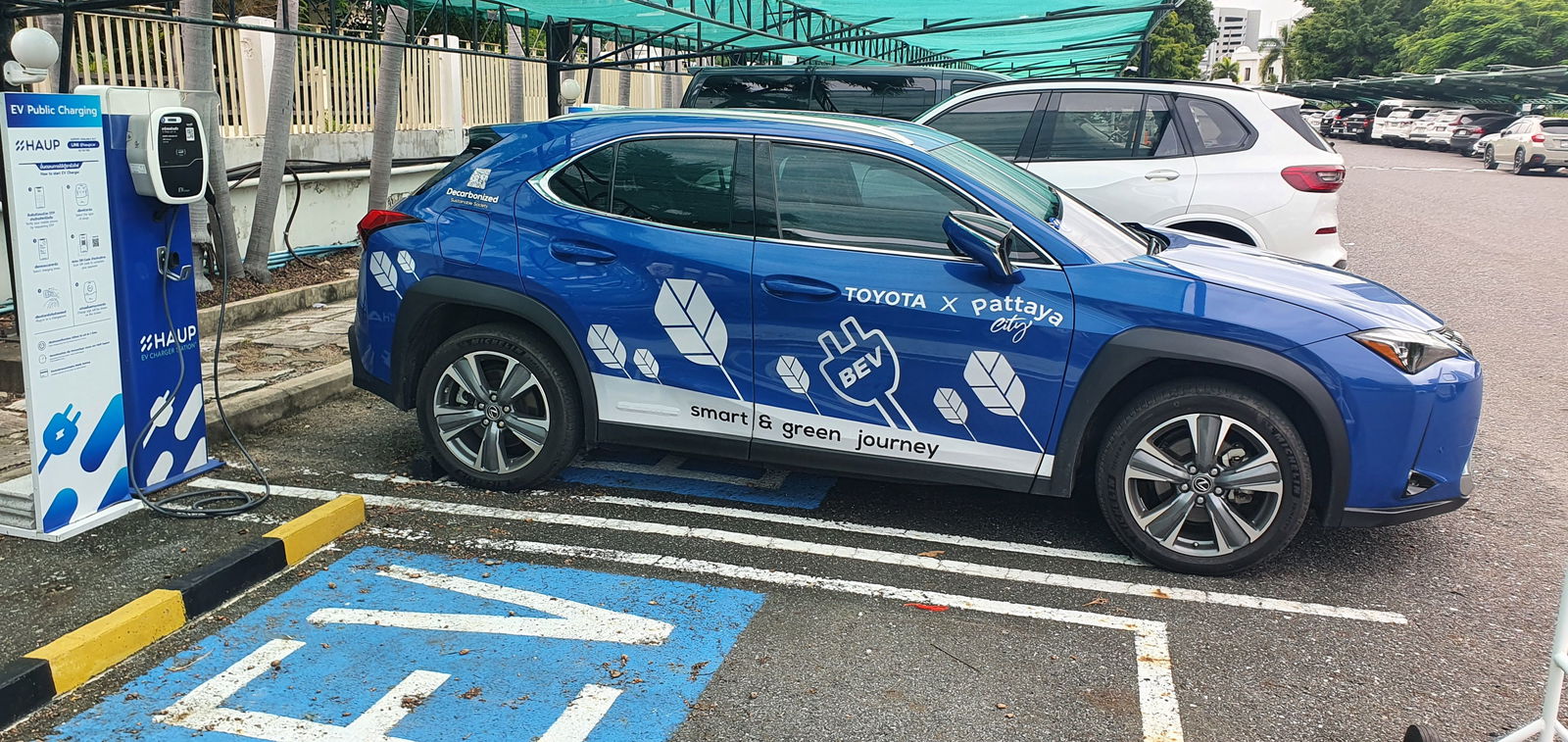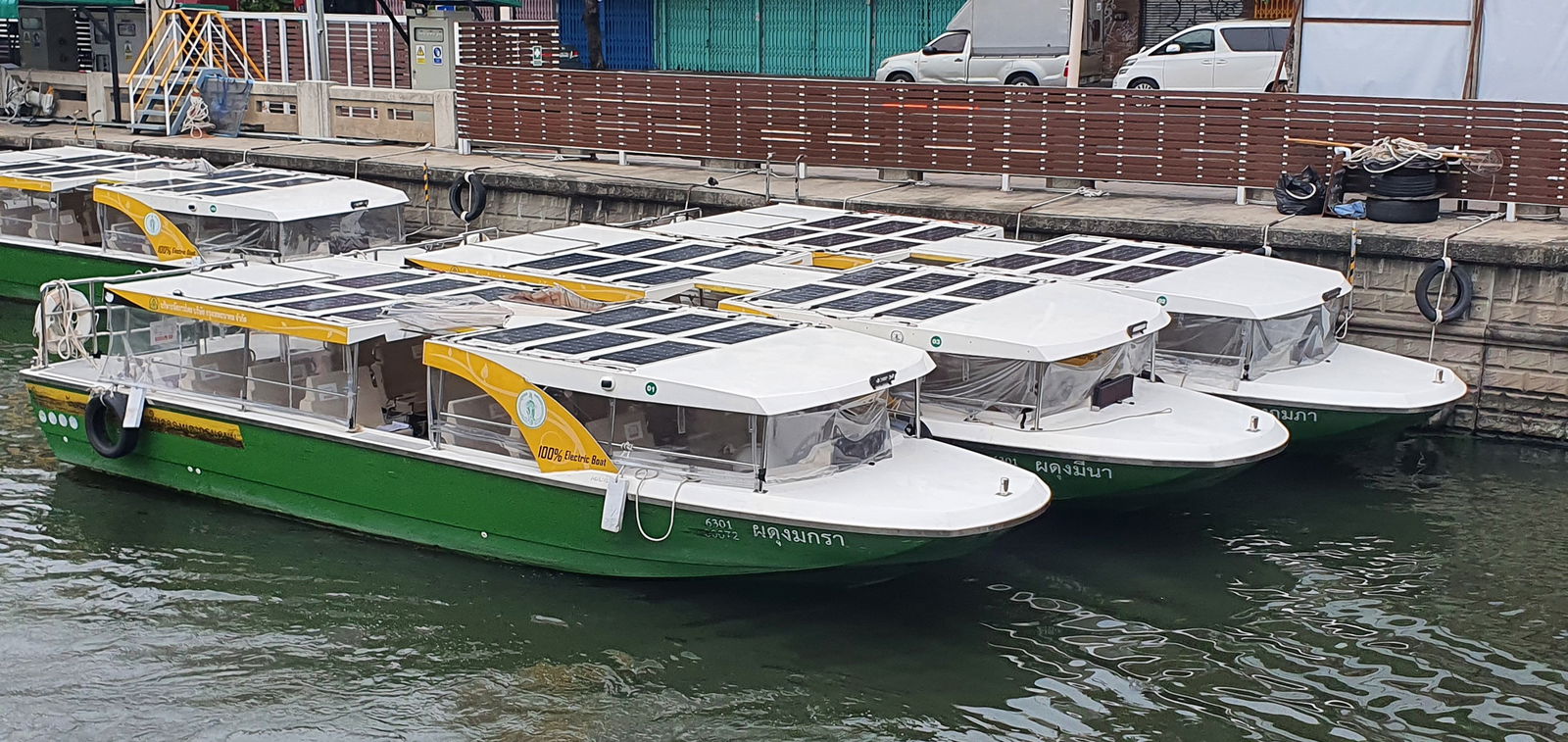· 11 min read
At COP26 in Glasgow, Thailand tightened its climate target to become carbon neutral by 2050 and climate neutral by 2065-2070, the latter including methane emissions from Thailand's vast rice fields. To meet the 2050 target, the energy sector is to reach 50 percent renewables by 2037, with an emphasis on floating photovoltaic systems and offshore wind. The most far-reaching objective, however, concerns the transport sector; by 2030 50 percent of all new vehicles in Thailand are to be electric while for 2035 the target is 100 percent. The goal applies for every kind of road transport, from the smallest tuk-tuk to the largest truck, as well as the manufacturing of vehicles. In that aspect the target is tougher than many other countries – for example Sweden’s 2030-target does not include what Volvo, Scania and others manufacture for export.
Southeast Asia's automotive hub looks to the future
In 2021, just under 1.7 million vehicles were produced in Thailand, making it the number one country in Southeast Asia for vehicle manufacturing, just outside the global top-ten list. Major Chinese, Japanese, American and German car brands are all producing cars here, in roughly that order of magnitude. Most build fairly basic pick-ups and vans for the regional ASEAN, South-East Asian market, something that the Thai government would want to change. A focus on higher-end products would increase the benefits for the national economy, while at the same time reduce the risk of manufacturers looking elsewhere within ASEAN to find cheaper cost of labor.
This is why Thailand’s strong emphasis on electric vehicles is not just focusing on the streets – where EVs help not only towards reaching the climate target but also to reduce air pollution in the major cities – but also on the factories. For the same reason, the country’s stimulus for electric vehicles is aimed at the manufacturers, not at the car buyer as in most countries.

In the next two years, the focus for Thailand is to get the domestic market for electric vehicles up and running, with a changed emphasis from 2024 when the main focus is local production of EVs. The Excise department of the Ministry of Finance signs individual agreements with vehicle manufacturers, who receive the equivalent of USD 2,000 per electric car sold on the Thai market, if the battery is 10-30 kWh, just over double that if the battery size is over 30 kWh. The stimulus is conditional on producing as many electric cars in Thailand as they import within three years, in five years 50 percent more – if these targets are not met, the incentive will have to be repaid partially or in full. To help this happen, import duty on key components is removed. Among those who have agreed are Chinese car companies MG, Great Wall and BYD, the latter now constructing a greenfield car plant to produce 150,000 EVs per year in Thailand from 2024. Taiwanese Foxconn is also planning to establish an electric car factory in Thailand, especially interesting because it is a joint venture with national oil and gas giant PTT which seeks to diversify its business. Toyota also signed a deal with the government, smaller in scope but potentially at least as important to attract other investors. Mercedes, which inaugurated a local battery assembly plant already in 2019, will assemble its advanced luxury electric car EQS in Thailand, a decision that may prove much more important than the limited production figures themselves.
To attract consumers, Thailand’s high tariffs on imported vehicles, up to 80 percent, is halved for electric cars that cost a maximum of approximately USD 60,000, and reduced to 60 percent for more expensive electric cars, provided that they have a battery of at least 50 kWh. The rebate is valid for vehicles with up to ten wheels, including hydrogen-powered ones. Furthermore, the excise tax on electric cars is reduced to 2 percent, against 8 percent for other cars. For electric motorcycles, every sale is sponsored with a flat USD 600, provided that the price to the customer is a maximum of USD 5,000, while importers of electric bicycles receive a three-year tax exemption.
In total, the government is allocating USD 90 million in 2022 for incentives for electric vehicles, and intends to allocate USD 1.2 billion over the next three years. Chatri Limpongsai, CEO of Thailand's Board of Investment, estimates that investments in electromobility in Thailand have now passed USD 5 billion, which may be seen as a good return on investment. Krisda Utamote, president of Thailand's electric car association EVAT predicts that by 2025 at least 10 percent of all vehicles manufactured in Thailand will be electric.
Not just cars: tuk-tuk and ferries
The three-wheeled tuk-tuk is a symbol of Thailand, but many are forty years old, noisy with unhealthy emissions and high fuel consumption. In Thailand's second-largest city, Chiang Mai, Uber's local counterpart Grab is turning 450 Tuk Tuks into electric power. Since the running costs are reduced by up to 80 percent, this does not require any subsidies, only that the owner is given the loan for the conversion and can easily re-register the vehicle. To speed up the transition, Grab is giving the electric tuk-tuks high visibility in its booking app, and is now bringing the experience to other markets.
Another symbol of Thailand is the longtail boats, which can be used even in very shallow waters due to its propeller being almost parallel to the water surface. They often use old truck engines with little or no noise and exhaust control, but in the floating market in Ratchaburi, the regional energy authority finances the conversion of 25 longtail boats to solar powered electric motors. The aim is to convert longtails in other floating markets, with much the same economic rationale as for the electric tuk-tuks.
According to navigation company TomTom, Bangkok with its ten million inhabitants is the world's busiest city. For quick commutes, the metro and the Skytrain are often the best choice, but due to high ticket prices, many lower income households mainly rely on the bus. The system is modern, with real-time information, wifi and mobile chargers at the bus station, but the buses themselves are ancient, noisy and uncomfortable. The Metropolitan Region wants to change this with electric buses, through a first-of-its-kind agreement with Switzerland. It funds the e-buses and uses the climate gains towards reaching its own climate targets, through an agreement under the Article 6 of the Paris Agreement. Up to 5,000 buses will be replaced, the first several hundred currently being delivered by local manufacturer Energy Absolute, which will also operate some of the concession routes. EVATs spokesperson Yossapong Laoonual sees the e-buses as crucial to the whole transition "When public transport transitions, everyone understands the concept. In addition, they are of great importance to the environment because they are used by many and run a lot."

The Chao Phraya river divides Bangkok into two, and for those living or working across the river ferries are the main mode of transport. Most of them are old, dirty and noisy. Smart Ferry challenges this with a fleet of twenty electric ferries that each take 250 people, have a 10 knots per hour cruising speed which is faster than regular ferries and can run the whole day with only limited support charging, due to their 800 kWh batteries. The Smart Ferry is a subsidiary of the same Energy Absolute providing buses to Bangkok, which now also launches a small electric truck, covering the needs of many transport companies since it can also be configured as a small bus, a food truck and other applications. To speed up the conversion, EA CEO Sompote Ahunai is proposing that only electric freight should be allowed to enter Bangkok at night.
Not just vehicles: batteries
The battery is the most valuable part of an electric vehicle, and Thailand doesn't want to depend on imports from China and Korea. Therefore, anyone manufacturing batteries in Thailand receive USD 20 per kWh in return for lowering the price to the buyer – typically a vehicle manufacturer – by the same amount.
American Evlomo is investing USD 1.2 billion in a 8 GW lithium-ion battery factory; a capacity equivalent to the needs of about 30,000 electric buses or 250,000 electric cars. Local producer EA already opened Southeast Asia's largest battery factory in Chachoengsao, Thailand, with annual capacity of 1 GW, which can be increased to 10 GW as demand increases.
The state as first mover
In many markets around the world, state agencies are helping the EV market to develop be being first movers in acquiring electric cars. Thailand is no different, but more interesting is how others are incentivized to change, with the Thai Ministry of Industry's agreement with construction giant Siam Cement as a leading example. Siam will electrify 2,000 of their vehicles, such as cement mixers and forklifts. When there is no electric version of these vehicles available on the market, Siam will take responsibility for the conversion.
Using the same rationale, the state energy conglomerate EGAT's is installing a battery replacement facility at its headquarters, encouraging motorcycle taxis to switch to electricity. With hundreds of transports to and from the HQ every day, EGAT believes it can create a market for 600 electric motorcycles already in the first year of operations. At the other end of the market, the tank trucks at Bangkok’s Don Mueang Airport will be converted to electric power by Bangkok Aviation Fuel Services which sees this as a first step to diversify its revenue away from aviation fuels.
The chicken or egg: the charging infrastructure first
The countries that have come the furthest in the transition to electromobility have had to deal with the chicken and the egg situation; who will install a charging infrastructure if there are no EVs and who will buy an EV if there is nowhere to charge it?
The Thai government has set the goal of 12,000 fast chargers by 2030, while the state electricity company MEA is lowering the price of electricity used for charging to encourage property owners to install chargers.
Amongst car companies, BMW with its ChargeNow brand was a first mover, beginning to install public chargers already in 2017 and now surpassing 600. This is an important reason why they now have almost a third of the market for electrified cars – mainly plug-in hybrids – despite the fact that their cars are almost twice as pricey in Thailand as in Europe. MG, Porsche and Nissan have followed suit and Volvo is establishing solar-powered chargers at their dealerships, inviting everyone is to charge and hoping to show their products while the car is being charged. The largest charging network is being developed by Chinese car company Great Wall, producer of the local EV best seller Ora Cat, which is partnering with EGAT, the regional electricity companies and Bangkok's electricity companies.
Not just electricity: the bio-initiative continues
Thailand's transport target is focused on electromobility, but biofuels play an important role in reaching its overall climate target. At the gas station one refuels B20, diesel with 20 percent locally produced biodiesel, and "gasohol" E20, gasoline with 20 percent ethanol. As oil prices have risen, the blend has acted as a buffer, which is a key reason for national biofuel subsidies to be extended until at least 2024. There is also government support for E85, with 85 percent ethanol and 15 percent petrol. It was previously available at more than 1 100 gas stations, but since only some car brands offer Flexifuel-cars, the number of E85 gas stations has decreased rapidly.
The biofuels also provide additional income for the country’s farmers, which grow over two million hectares of sugarcane and cassava for ethanol. Since blending began just over 15 years ago, it has reduced oil imports by 12 billion liters and carbon dioxide emissions by 35 million tonnes.
Not only car sales: also carpools
In Thailand as in many other countries, owning your own car is a status symbol for many, but especially in Bangkok where parking is scarce and traffic is dense, more and more people are interested in having access to cars without the hassles of ownership. The leading carpool operator Haupcar now offers upwards of a thousand cars in over a hundred locations, with a rapidly increasing proportion of electric cars. This includes a hundred locally manufactured Fomm, the world's smallest four-seater electric car, adapted to the monsoon's flooding since it actually floats. It became a well-known and appreciated feature during the covid lockdown, as it was lent free of charge to hospital staff.
How's it going?
As everywhere else, sales of electric vehicles in Thailand is increasing. As we have seen, the switch is happening particularly for public transport, small trucks and passenger cars. But is it enough to meet Thailand’s goal? The stimulus provides clues; It binds manufacturers to produce EVs domestically and many manufacturers have already signed the agreements. But most of the stimulus is short-term and the government is not always consistent with the targets – sometimes 30 percent EVs rather than 50 is mentioned for 2030, and at times the emphasis is only on the domestic market, leaving the production target out. Furthermore, with its 18 coups d'état and as many constitutions, there would be some justification is doubting long-term Thai targets.
The main reason why we may be confident in Thailand’s targets for electromobility, is the value it creates for the country and its economy. Clearer than perhaps any other country, Thailand has posed the question in a way that can only be answered affirmatively: Do we want to leave the low-income, low-margin, unsustainable sector of automotive business behind, focusing on higher value, more profits and a improved sustainability, gaining international acclaim and recognition as we go?
Sources
Thailand: 100 Evs 2035: Bloomberg,https://www.bloomberg.com/news/articles/2021-04-22/thailand-lays-out-bold-ev-plan-wants-all-electric-cars-by-2035
Thailand’s climate target: UNFCCC, https://unfccc.int/sites/default/files/NDC/2022-06/Thailand%20Updated%20NDC.pdf
Thailand’s agreements with manufacturer (example): Thai Board of Investment, https://www.boi.go.th/index.php?page=advertorial12&language=en
Global vehicle manufacturing numbers: Statista,https://www.statista.com/statistics/226032/light-vehicle-producing-countries/
Other sources are mostly easy to find, but can also be had from the author on request
illuminem Voices is a democratic space presenting the thoughts and opinions of leading Sustainability & Energy writers, their opinions do not necessarily represent those of illuminem.






